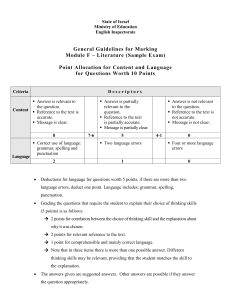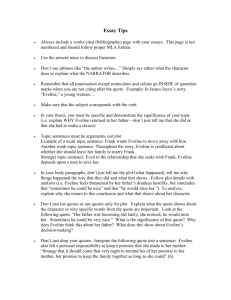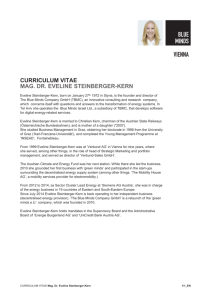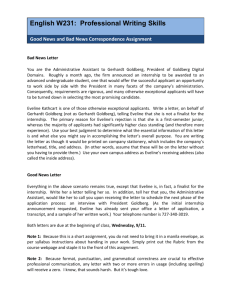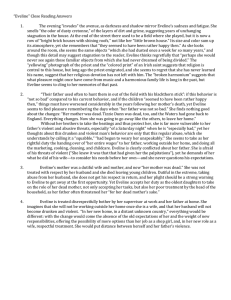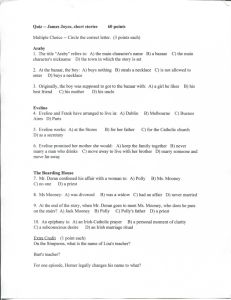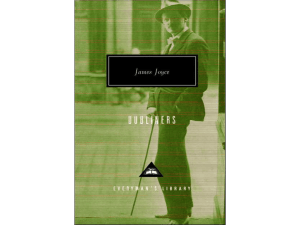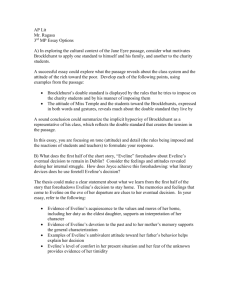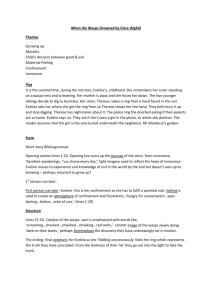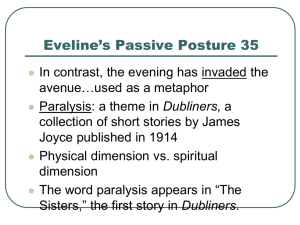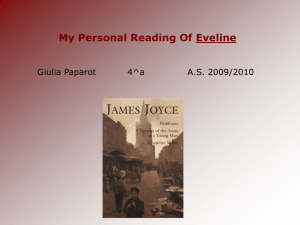State of Israel
advertisement
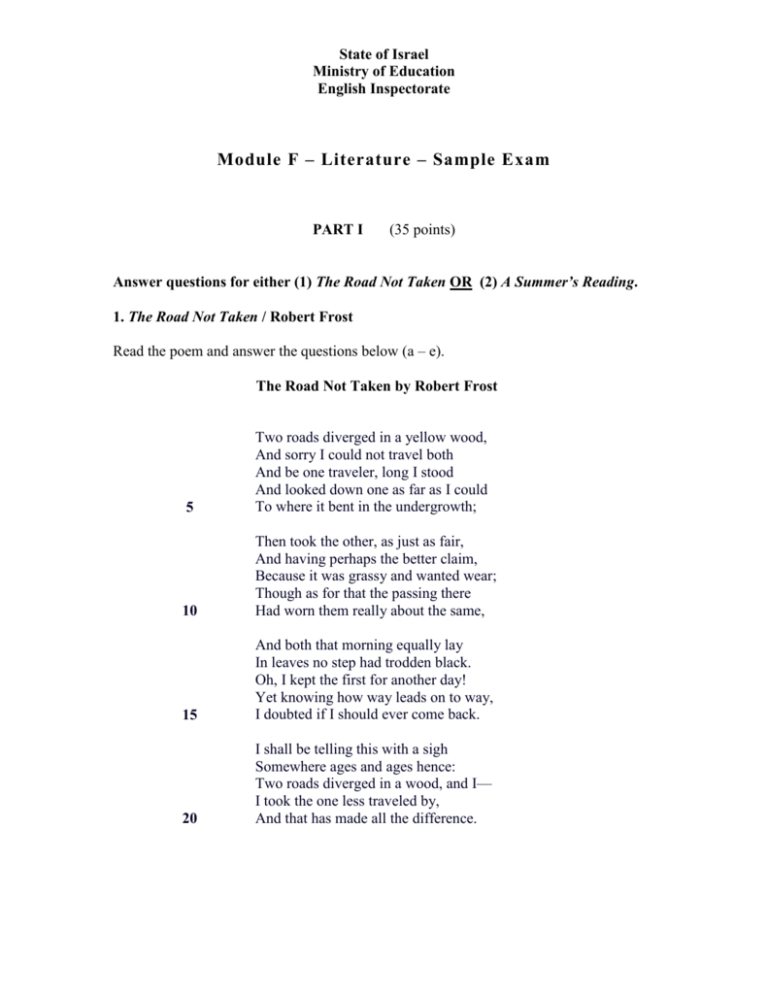
State of Israel Ministry of Education English Inspectorate Module F – Literature – Sample Exam PART I (35 points) Answer questions for either (1) The Road Not Taken OR (2) A Summer’s Reading. 1. The Road Not Taken / Robert Frost Read the poem and answer the questions below (a – e). The Road Not Taken by Robert Frost 5 Two roads diverged in a yellow wood, And sorry I could not travel both And be one traveler, long I stood And looked down one as far as I could To where it bent in the undergrowth; 10 Then took the other, as just as fair, And having perhaps the better claim, Because it was grassy and wanted wear; Though as for that the passing there Had worn them really about the same, 15 And both that morning equally lay In leaves no step had trodden black. Oh, I kept the first for another day! Yet knowing how way leads on to way, I doubted if I should ever come back. 20 I shall be telling this with a sigh Somewhere ages and ages hence: Two roads diverged in a wood, and I— I took the one less traveled by, And that has made all the difference. a. In the first stanza of the poem (lines 1-5), what is the traveler’s dilemma? _____________________________________________________________________ _____________________________________________________________________ _____________________________________________________________________ (5 points) b. In what ways are the roads in stanzas 1 and 2 (lines 1 – 10) similar? Give TWO ways. (1) __________________________________________________________________ __________________________________________________________________ (2) __________________________________________________________________ __________________________________________________________________ (5 points) Read the quote and answer question c. The speaker of the poem says, “Yet knowing how way leads on to way, / I doubted if I should ever come back.” c. Give the literal and symbolic meaning of these lines. Literal meaning: _________________________________________________________ ________________________________________________________________________ ________________________________________________________________________ Symbolic meaning: _______________________________________________________ ________________________________________________________________________ ________________________________________________________________________ (10 points) 2 d. Why does the speaker say he will “be telling this with a sigh / Somewhere ages and ages hence”? Thinking skill I chose: (See Appendix One for the list of Thinking Skills) ________________________________________. Answer:_____________________________________________________________ _____________________________________________________________________ _____________________________________________________________________ _____________________________________________________________________ _____________________________________________________________________ (10 points) e. Explain why you chose this skill to answer question d. _____________________________________________________________________ _____________________________________________________________________ _____________________________________________________________________ (5 points) 3 2. A Summer’s Reading / Bernard Malamud Answer the questions below (a – e). a. Describe the relationship between Mr. Cattanzara and George in the beginning of the story? _____________________________________________________________________ _____________________________________________________________________ _____________________________________________________________________ (5 points) Read the following quote and answer question b. “I got a list of books in the library once, and now I’m gonna read them this summer.” b. Who did George say this to and why? _____________________________________________________________________ _____________________________________________________________________ _____________________________________________________________________ (5 points) Read the following quote and answer questions c – e. "George knew he looked passable on the outside, but inside he was crumbling apart. Unable to reply, he shut his eyes, but when - years later - he opened them, he saw that Mr. Cattanzara had, out of pity, gone away but in his ears he still heard the words he had said when he left 'George, don't do what I did.' " c. Why did the author use the metaphor “crumbling” to describe George? _____________________________________________________________________ _____________________________________________________________________ _____________________________________________________________________ (10 points) 4 d. What do Mr. Cattanzara’s parting words, “… don't do what I did.” reveal about his feelings about his own life? Thinking skill I chose: (See Appendix One for the list of Thinking Skills) ________________________________________. Answer:________________________________________________________________ ________________________________________________________________________ ________________________________________________________________________ ________________________________________________________________________ ________________________________________________________________________ (10 points) e. Explain why you chose this skill to answer question d. _____________________________________________________________________ _____________________________________________________________________ _____________________________________________________________________ (5 points) 5 PART II (35 points) 3. All My Sons / Arthur Miller Answer the questions (a – e) below. Read the following quote and answer questions (a – b). Chris: “I know you’re no worse than most men but I thought you were better. I never saw you as a man. I saw you as my father.” (Act III) a. Why did Chris say this to his father? _____________________________________________________________________ _____________________________________________________________________ _____________________________________________________________________ (5 points) b. What effect did Larry’s letter have on Chris? _____________________________________________________________________ _____________________________________________________________________ _____________________________________________________________________ (5 points) Read the following quote and answer question c. Jim: …In a peculiar way Frank is right - every man does have a star. The star of one's honesty. And you spend your life groping for it, but once it's out it never lights again. I don't think he went very far. He probably just wanted to be alone to watch his star go out. c. What did the star symbolize for Chris and for Jim? (10 points) (For Chris) ___________________________________________________________ _____________________________________________________________________ (For Jim) _____________________________________________________________ _____________________________________________________________________ 6 Answer questions d – e. d. How does the reader’s understanding of the title of the play change as the play progresses? Thinking skill I chose: (See Appendix One for the list of Thinking Skills) ________________________________________. Answer:_____________________________________________________________ _____________________________________________________________________ _____________________________________________________________________ _____________________________________________________________________ _____________________________________________________________________ (10 points) e. Explain why you chose this skill to answer question d. _____________________________________________________________________ _____________________________________________________________________ _____________________________________________________________________ (5 points) 7 PART III (30 points) Answer questions for either (4) Eveline OR (5) Richard Cory. (about 80-100 words) 4. Eveline / James Joyce “The Dubliners, a collection of short stories published in 1914 which includes Eveline, has as its central theme what Joyce, himself, called ‘moral paralysis’ of Ireland. Many of the central characters in these stories, and Eveline is typical of them, want to escape their prisons – but are unable to break out of social, cultural and religious traditions which tie them to the world of lower-middle-class life in the poorer parts of Dublin.” (Enav, Y. 1978. Everyman’s English Secondary Level. Eveline. Open University and Educational Television. Tel-Aviv: Israel.) How does this information add to your understanding of Eveline? Give examples from the story. Answer:________________________________________________________________ ________________________________________________________________________ ________________________________________________________________________ ________________________________________________________________________ ________________________________________________________________________ ________________________________________________________________________ ________________________________________________________________________ ________________________________________________________________________ ________________________________________________________________________ ________________________________________________________________________ ________________________________________________________________________ ________________________________________________________________________ ________________________________________________________________________ ________________________________________________________________________ 8 5. Richard Cory / Edwin Arlington Robinson Edwin Arlington Robinson (1869-1935) is an American poet best known for his poems about the characters of Tilbury Town, a small, bleak Maine town like the one where Robinson grew up. His characters suffer the ‘cruelties of life.’” (Shalvi, A. (Ed.). 1982, EMT Reader. University Publishing Projects: Israel) How does this information add to your understanding of Richard Cory? Give examples from the poem. Answer:________________________________________________________________ ________________________________________________________________________ ________________________________________________________________________ ________________________________________________________________________ ________________________________________________________________________ ________________________________________________________________________ ________________________________________________________________________ ________________________________________________________________________ ________________________________________________________________________ ________________________________________________________________________ ________________________________________________________________________ ________________________________________________________________________ ________________________________________________________________________ ________________________________________________________________________ 9 Appendix One List of Thinking Skills Comparing/ Contrasting Classifying Making Connections Parts and Whole Different Perspectives Sequencing Uncovering Motives Causal Explanations Prediction Generating Possibilities Problem Solving Synthesis Application 10
